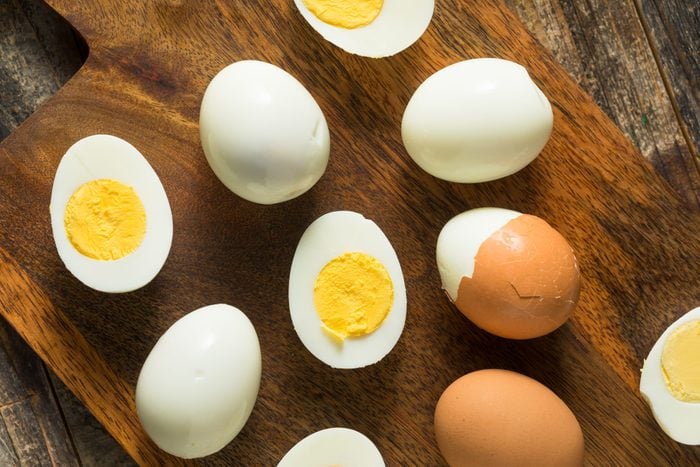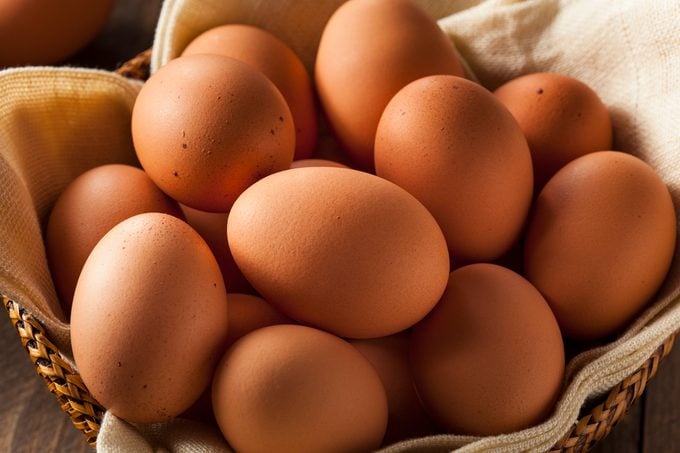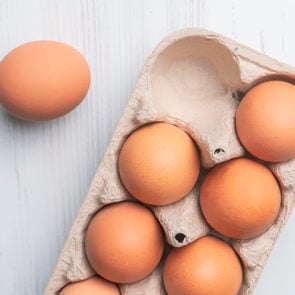The Trick to Peeling Hard-Boiled Eggs Perfectly Every Time
Updated: Jan. 11, 2024

Get cracking! Want to learn how to peel hard-boiled eggs the right way? Follow these steps for a mess-free, painless peel.
You may already know how to fry eggs, bake eggs, poach eggs and how to make scrambled eggs—you may have even mastered Dolly Parton’s scrambled eggs recipe! And yet, perfecting the hard-boiled egg is a skill that escapes you. To be fair, while the humble egg may seem like a simple food to grasp (hello microwaved scrambled eggs!), as anyone who has struggled to fine-tune their fluffy scrambled eggs can tell you, eggs can be incredibly difficult. And cooking is only half the battle. When it comes to learning how to peel hard-boiled eggs, even the best chefs struggle. Here’s how to do it.
How should you cook hard-boiled eggs to make them peel easily?
To make eggs that are easier to peel, our Taste of Home Test Kitchen experts actually recommend not boiling your eggs at all. You read that right! The best hard-boiled eggs are not, in fact, hard-boiled. Rather, the experts suggest you place your eggs in a medium-to-large steamer basket that’s inserted into a pot. Fill the pot with water up to the base of the steamer basket and place on the stove over high heat. Once the water begins to boil, set a timer for 14 minutes.
When time is up, remove the eggs from the basket and immediately plunge them into a bowl of ice water to stop the cooking process. This should create perfectly hard-“boiled” eggs.
Should you add anything to the water?
While the internet is full of hacks (such as adding vinegar or baking soda to the water), it’s not necessary. When our experts put those additions to the test, they had no effect on making the hard-boiled eggs easier to peel.
Does the age of the egg matter?
Yes! Of course, you can hard-boil your eggs no matter how old they are, but according to the Taste of Home Test Kitchen, older eggs peel more easily. If your eggs are fresh, you might notice that stringy white stuff next to the yolk. But if your eggs are reaching their use-by date, they’re perfect for hard-boiling. And no matter how you plan to cook them, always make sure they’re properly handled—that includes never washing eggs, always making sure eggs are refrigerated and learning how to tell if your eggs are still good.
How to peel hard-boiled eggs easily

Ice plunge
Just like there are correct ways to crack an egg, there are also proper ways to peel an egg. Whether you choose to hard-boil eggs in an Instant Pot or an oven, steam your eggs like the experts recommend or simply boil them the old-fashioned way, there’s only one hard rule when learning how to peel hard-boiled eggs easily: After boiling, immediately transfer the eggs to a bowl of ice water and let them cool for a few minutes.
Ice plunges accomplish two important things. First, shocking the eggs in ice water stops the cooking process. Hot eggs will continue to cook from residual heat, and overcooked hard-boiled eggs can have rubbery whites and crumbly, sulfury gray-green yolks. To get that perfect consistency, you must drop the surrounding temperature dramatically. Second, plunging hot eggs into a bowl of ice water can cause the egg white to shrink and pull away from the shell, making the egg easier to peel.
Get cracking
The way you crack your eggs is important! Instead of giving them a little tap and picking away at the shell bit-by-bit, roll your hard-boiled egg back and forth on a hard surface until the shell is completely cracked. It should look like a cool mosaic before you even begin to peel. Once completely cracked, press your thumb to the large end of the egg and find the air pocket, then push your finger through and start peeling off the shell. Starting from the air pocket helps separate the thin skin (also known as the membrane) from the egg’s surface.
To make things even easier, peel underwater. As you peel, water will force its way between the egg and its shell, loosening it enough for you to easily remove it.
Shake it up
If you only have a few eggs to peel, this method is not only effective, but also fun. Fill a Mason jar with at least one inch of water. Add your eggs, tightly screw on the top and shake. As the eggshells crack, the moving water will help separate, loosen and remove the shell. Once most of the shell has fallen off, use your hands to peel off the rest, and give it a quick rinse under cold water to remove any tiny shell specks.
How do you peel hard-boiled eggs that don’t want to peel?
This should be a food quiz or food trivia question. Some hard-boiled eggs are just plain stubborn, after all. If your hard-boiled eggs just won’t budge, try cracking them all over and gently rolling between your palms to loosen the shell. Next, use your thumb to pierce the shell at the air pocket, then submerge the eggs in a bowl of cold water for a few minutes before trying again. If the eggs you boiled are super fresh, they might be impossible to peel perfectly. Fortunately, hard-boiled eggs are delicious no matter what they look like!
Mistakes to avoid
Want to know how to peel hard-boiled eggs without making mistakes? Here are the most common ones to avoid.
- Not cooling them quickly. If the eggs are still hot, the egg white will more tightly adhere to the shell, making it harder to peel. It’s best to transfer the eggs to a bowl of ice water immediately after boiling to cool them off quickly.
- Peeling the egg while it’s still warm. The egg will be more difficult to peel if it’s still warm, so make sure to let it cool completely before peeling.
- Using fresh eggs. As eggs age, the air pocket inside the egg increases and makes it easier to peel. Of course, you certainly can hard-boil fresh eggs if that’s what you have, but be prepared for a more difficult peeling process.
Next, learn this viral TikTok hack for cutting hard-boiled eggs to get that perfect slice.

